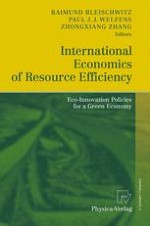2011 | OriginalPaper | Chapter
13. How to Reduce the Rebound Effect?
Author : Wolfgang Irrek
Published in: International Economics of Resource Efficiency
Publisher: Physica-Verlag HD
Activate our intelligent search to find suitable subject content or patents.
Select sections of text to find matching patents with Artificial Intelligence. powered by
Select sections of text to find additional relevant content using AI-assisted search. powered by
